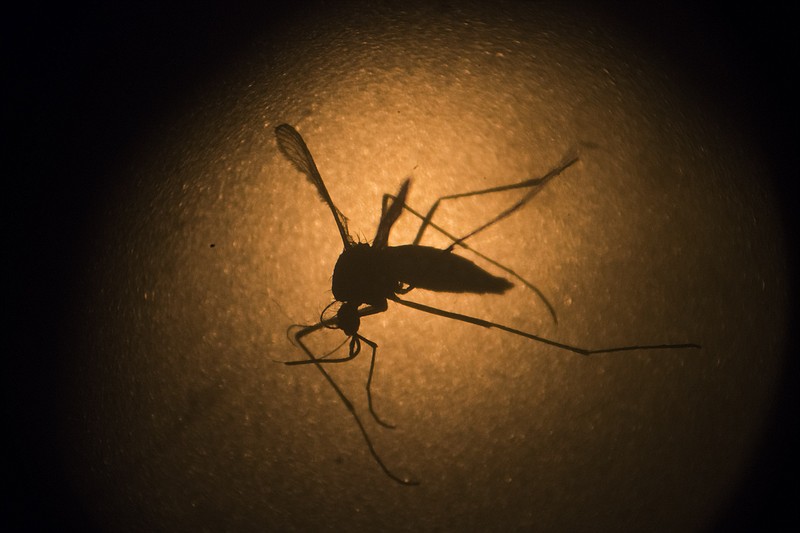WASHINGTON-A dysfunctional Senate split along party lines on Tuesday and left a $1.1 billion proposal to fight the Zika virus in limbo, despite growing fears and a more than 800 cases of Zika infection in the continental U.S.
Florida confirms birth defects after mother contracts virus while abroad
TALLAHASSEE, Fla.-Florida confirmed its first Zika-related case of microcephaly, in a child whose mother contracted the virus in Haiti, officials said Tuesday. In a statement, Republican Gov. Rick Scott called the diagnosis "heartbreaking" and asked federal health experts to talk with Florida medical professionals about what precautions pregnant women should take. The mother is a Haitian citizen who came to Florida to give birth, and the family would be connected with a state program for infants and toddlers with developmental delays, according to a statement from Florida's Department of Health. The extent of Haiti's Zika outbreak is unknown due to the country's lack of routine data collection systems. Its health ministry hasn't reported any Zika-related microcephaly cases, though it has reported about a dozen suspected cases of the neurological disorder Guillain-Barre, including two definitively linked to Zika by lab tests. The virus is primarily spread by tropical mosquitoes. It's linked to birth defects, including microcephaly, which causes babies to be born with abnormally small heads and incomplete brain development. Federal health officials have tracked four babies born in the U.S. with Zika-linked birth defects. The defects were also seen in four other pregnancies that ended in miscarriage, stillbirths and terminations. All the cases stem from travel primarily Latin America and the Caribbean. There's been no local spread of Zika in the U.S. Frustrated by an ongoing federal stalemate over Zika funding, Scott used his emergency powers last week to authorize spending up to $26.2 million to try and stop its spread in Florida. Senate Democrats, including Bill Nelson of Florida, on Tuesday blocked a GOP proposal to provide $1.1 billion to fight the Zika virus, faulting Republicans for including restrictions on Planned Parenthood money and changes to policies on pesticide spraying. Nelson said that bill was an effort to "further extremist political agendas." Republican Florida Rep. Vern Buchanan said in a statement that Senate Democrats were putting "politics ahead of public health." -The Associated PressWhat happens next is unclear. Neither side is looking forward to leaving Washington next month for a seven-week vacation without having acted to address the health threat, but hard feelings seemed to harden in the immediate aftermath of the vote, leaving any path forward in doubt.
Zika is spread mainly by a tropical mosquito and is causing an epidemic in Latin America and the Caribbean. The virus can cause horrible birth defects and is likely to spread further this summer. So far, there's been no transmission by mosquitoes in the continental U.S.
The more than 800 cases include almost 300 pregnant women at risk of delivering children with severe deformities.
Democrats pressed to resume negotiations while Republicans insisted, for now at least, that the measure negotiated by House and Senate Republicans is the best the Obama administration is going to get. The administration had requested $1.9 billion in emergency funds in February.
"There's not going to be another opportunity to deal with this in the near future," promised No. 2 Senate Republican John Cornyn of Texas. Majority Leader Mitch McConnell, R-Ky., insisted that it was impossible to reopen the House-Senate agreement or begin new talks.
"The negotiations have already occurred," McConnell told reporters. "I would say to my Democratic friends there are some disadvantages to not being in the majority. You don't get everything exactly the way you want."
The White House has threatened to veto the legislation.
The House-Senate measure matches the $1.1 billion measure that passed the Senate last month on a sweeping vote, but Democrats oppose a handful of provisions designed to mollify GOP conservatives in the House and the attachment of companion spending cuts to defray its cost.
Democrats particularly oppose a provision that restricts the use of $95 million worth of federal grants to provide services such as birth control to women in Puerto Rico threatened by the virus. Democrats charged that the restrictions were targeted at Planned Parenthood, a group loathed by many anti-abortion Republicans.
In addition to the limits on Planned Parenthood, the bill would temporarily lift Clean Water Act permitting requirements on pesticide spraying for municipalities and other large-scale users.
Even as Democrats pressed for compromise, they crowed that Republicans would soon reconsider.
"They come back with their tail between their legs saying 'Let's pass something,'" said Sen. Charles Schumer, D-N.Y.
Republicans controlling Congress have been slow to act on Obama's request, instead forcing the administration to redirect more than $500 million in unspent Ebola-fighting funds to combat Zika.
The measure is an agreement between House and Senate Republicans who say they drafted it in hopes of finding a compromise that could somehow satisfy both tea party Republicans and Obama's Democratic allies in the Senate. It did nothing of the sort. The House passed the measure along party lines last week.
Each side already has begun the blame game. Cornyn appeared on the Senate floor with a poster of a baby born with microcephaly, a severe deformity in which children are born with poorly developed brains and small skulls. Florida has been hit by its first case of microcephaly from a Haitian woman who came to Florida to give birth.
"I wonder what the senators who voted against this bipartisan Zika funding bill would tell the mother of this child," Cornyn said.
"What a cynical and hypocritical thing to do," Schumer said. "All Democrats have ever asked for on Zika was to give the (Centers for Disease Control) and the other agencies to protect the American people, pregnant mothers, and their babies from this dangerous virus."

